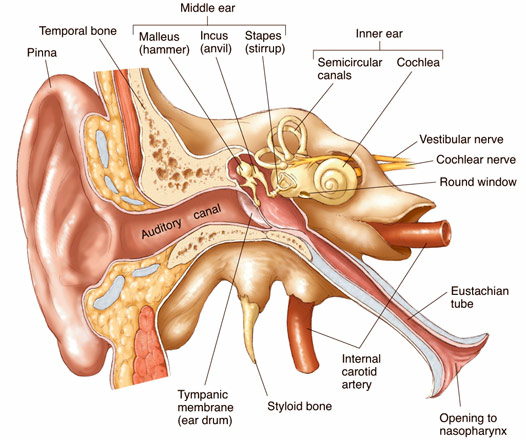The human ear is a sophisticated piece of equipment that has been developed and honed over many years of evolution. Until we start experiencing hearing loss, we often take our ears for granted. Turn that music down!
So, how exactly does human hearing work?
As you probably remember from school, sound travels in waves. When sound waves reach our ears, they travel and vibrate down into the ear until they hit our eardrum. Once the sound waves have reached the eardrum, the vibrations are passed along bones (hammer, anvil and stirrup bones) and filtered through the cochlea (on a diagram of the anatomy of the human ear, the cochlea, along with the semicircular canals, often looks like a snail) and hair cells (absolutely vital to the entire process), transforming the vibrations into nerve impulses along the way. These impulses are then fired off to the brain. The brain then decodes and processes the sound! Amazing, hey?

Anatomically speaking, the human ear can be broken down out into three key parts; the outer ear, the middle ear and the inner ear. The outer ear is the section of the ear that we’re all familiar with, the part that gets cold in the winter, or goes red when we’re embarrassed, leading down the auditory canal to the eardrum (a very thin membrane and gatekeeper to the middle ear). Deeper into the ear, and beyond the eardrum, the middle ear contains the tiny hammer, anvil and stirrup bone. Sound is processed mechanically through the middle ear as the bones conduct the sound to the inner ear via vibration. The inner ear is the electrical component and contains an assortment of nerves, the aforementioned cochlea and semicircular canals which assist in our balance.
Even when you are sleeping, your ears continue to function just as they do when you’re awake. However, your brain intentionally disregards the sounds.
For questions about your hearing, please contact us. We’ll be happy to help.

Introducing Our New Financing Options At Academy, we are committed to providing our clients with the best possible service and support. We’re excited to introduce our new financing partner Humm to make it easier than ever to get the...
Read More-3.png)
“If the hearing aids are programmed for my hearing loss, why do I need to come for follow up appointments? They either work or they don’t.” The answer: Hearing healthcare is a journey. Hearing loss needs to be monitored....
Read More-2.png)
Everyday we are learning more and more about hearing health, hearing loss, and cognitive decline. It may come as no surprise that our overall health is all connected and can be impacted both positively and negatively by what we do (or don’t...
Read More